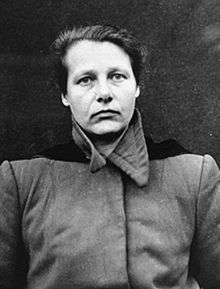Herta Oberheuser


Herta Oberheuser (15 May 1911 in Cologne, German Empire – 24 January 1978 in Linz am Rhein, West Germany) was a Nazi physician at the Auschwitz and Ravensbrück concentration camps from 1940 until 1943.
Biography
Medical experiments
Oberheuser worked at concentration camps under the supervision of Dr. Karl Gebhardt, participating in gruesome medical experiments (sulfanilamide as well as bone, muscle, and nerve regeneration and bone transplantation) conducted on 86 women, 74 of whom were Polish political prisoners in the camp. She killed healthy children with oil and evipan injections, then removed their limbs and vital organs. The time from the injection to death was between three and five minutes, with the person being fully conscious until the last moment. She performed some of the most gruesome and painful medical experiments, focusing on deliberately inflicting wounds on the subjects. In order to simulate the combat wounds of German soldiers fighting in the war, Oberheuser rubbed foreign objects, such as wood, rusty nails, slivers of glass, dirt, or sawdust into the cuts.
Nuremberg trials
Herta Oberheuser was the only female defendant in the Nuremberg Medical Trial, where she was sentenced to 20 years in jail. It was later reduced to 5 years in prison.
Release from prison
She was released in April 1952 for good behavior and became a family doctor in West Germany. She lost her position in 1956, after a Ravensbrück survivor recognized her, and her license to practice medicine was revoked in 1958. She died in January 1978.